Building bridges between civil society and the government in North Macedonia.

View of Skopje, North Macedonia.
Photo: Zefart via Dreamstime
On 22 and 23 September 2021, the GI-TOC’s Observatory of Illicit Economies in South Eastern Europe invited civil society representatives to a series of consultations in Skopje. The meetings provided an opportunity to strengthen resilience and networks among CSOs dealing with organized crime and corruption in North Macedonia, to try and build bridges between civil society and the government on these topics and to showcase the GI-TOC’s work in the Macedonian capital. The meeting was the first in a series of ‘resilience dialogues’ that will take place in all six Western Balkan capitals between September and December 2021.
These resilience dialogues follow a similar process that was launched in 2020, which brought together a diverse group of civil society actors from across the region to exchange experience and expertise and strengthen networks against organized crime and corruption. The series of community events provided insight into the wide array of civil society actors and initiatives present across the region. The results of the process were published in a March 2021 report entitled ‘Stronger together: Bolstering resilience among civil society in the Western Balkans.’
The meeting in Skopje kicked off the second year of the dialogues and involved civil society actors in North Macedonia, particularly those who are recipients of grants from the GI-TOC’s Resilience Fund, as well as CSOs that are part of the GI-TOC’s regional Network of Experts. In this small circle, participants shared views on the challenges faced by CSOs in dealing with organized crime and identified needs for building capacity and strengthening networks. As one participant said: ‘We cannot fight this problem on our own.’
Among the challenges identified were the corrosive effect of corruption (for example on politics and in the health care sector), the instrumentalization of anti-corruption campaigns for political agendas, captured governance (including at the local level), lack of access to official information and weak prosecution. There was also disappointment that the change of government in 2017 had not brought significant improvement, even with the involvement of former members of civil society in the executive branch.
Moving forward, it was noted that there should be greater support for research on organized crime, increased support for CSOs outside the capital, a stronger focus on education (particularly to counteract a ‘culture of corruption’), more focus on issues of concern to youth and more research on the positive and negative effects of digitalization, as well as greater cooperation among CSOs, the media and academia on exposing and addressing environmental crime. Furthermore, participants discussed how to highlight the harms of organized crime and corruption, and how to develop narratives of change and promote positive role models to inspire people.
A recurrent problem, in North Macedonia and throughout the region, is a lack of meaningful dialogue or engagement between CSOs and the government. CSOs are often considered by the government as a nuisance factor, or even anti-governmental. The other extreme is that certain NGOs are co-opted by the government, receive funding and promote government positions, which de facto make them government-organized NGOs.
To address this issue, the GI-TOC, together with the Skopje-based think tank Eurothink – Center for European Strategies, co-organized a meeting between CSOs and government officials on ‘building bridges between civil society and the government’ to discuss existing mechanisms of civil society and government cooperation as well as possible areas of improvement. Participants from civil society and the government, which included representatives from the Ministry of Internal Affairs, Parliament, the National Committee for Violent Extremism and the State Commission for the Prevention of Corruption, agreed that when it comes to preventing and fighting organized crime and corruption, civil society and government should be on the same side.
The session also provided an opportunity for an open exchange of views and ideas on how to improve cooperation, particularly on the issue of migration. Some civil society participants called for a greater role for NGOs in evaluating the government’s performance in dealing with corruption and organized crime, for example in the context of EU accession. It was also noted that CSOs should be consulted more widely in the drafting of relevant legislation and national strategies and be given greater opportunities to interact with government officials in consultative bodies.
Ways were also discussed about how to maintain sustainability of projects and continuity of engagement between CSOs and the government, for example through the creation of a state secretariat for the NGO sector. Several participants expressed the view that it is important to engage more actively with the private sector and religious leaders in strengthening integrity and fighting corruption.
During its visit, the GI-TOC team met with the Minister of Internal Affairs, Oliver Spasovski. The meeting provided an opportunity to describe the GI-TOC’s work and efforts to improve cooperation between civil society and the government in fighting organized crime and corruption, as well as the importance of promoting more effective regional cooperation to fight transnational organized crime.
The consultations showed that bridges between the government and civil society cannot be built overnight. But the foundation can be laid through dialogue.
